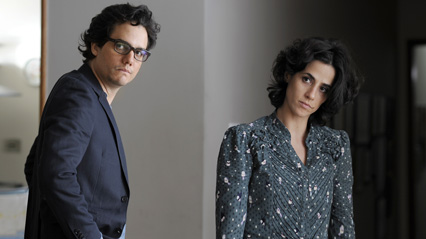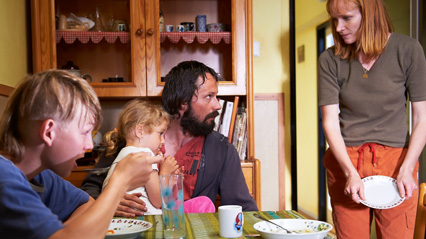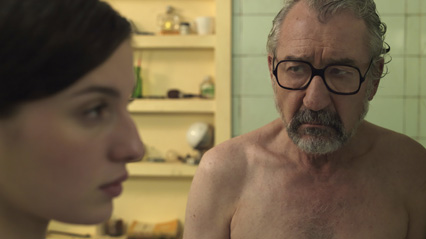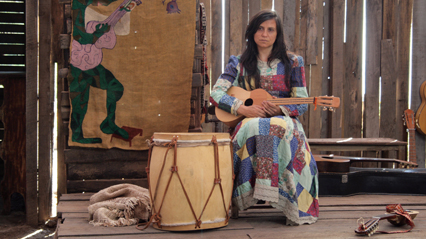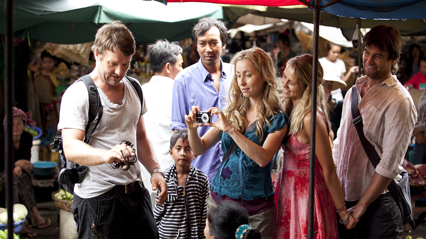

By Kim Voynar Voynar@moviecitynews.com
Sundance Preview: World Dramatic Competition
With the World competitions, I often don’t know a lot about the directors, so I have to pretty much go by what looks interesting from the catalog descriptions. It can be a bit of a crapshoot, since those descriptions tend to make every film at the fest sound like the Next Big Thing, but hey, that’s part of the fun of Sundance. Here are the films from the World Dramatic Competition field that I’m most interested in checking out this year at Sundance. (Note: All film descriptions are from the Sundance film guide.)
About the Pink Sky, Keiichi Kobayashi (Japan)
What It’s About: Izumi, a headstrong high-school girl with a cheerfully cynical outlook—she routinely “rates” the newspaper by assigning articles positive or negative values—finds a wallet containing 300,000 yen (almost $4,000) and the owner’s ID: Sato, a wealthy high-school boy. Instead of returning it, Izumi lends a hefty sum to an older fishing buddy with financial problems. Her classmates Hasumi and Kaoru later force her to return the wallet to Sato, but, unable to account for all of the money, Izumi agrees to help him console a friend in the hospital by creating a newspaper containing only “good news.”
Keiichi Kobayashi’s serene, coming-of-age story avoids the customary trappings of teen culture and genre with a pronounced sense of quiet. With its lively, black-and-white cinematography and long takes, Kobayashi’s aesthetic—drained of color and clutter—feels like a dream or a distant memory. About the Pink Sky owes its underlying energy to the young actors (all newcomers) with real chemistry, who deftly balance the quirky humor, teenage uncertainty, and subtle shifts in adolescent consciousness.
Pedigree: This is the filmmaker’s feature debut. Won the Japanese Eyes best picture award at TIFF (Toyko) in November, 2011.
Father’s Chair, Luciano Moura (Brazil)
What It’s About: Theo is living the good life in an upscale Brazilian neighborhood. He’s a hardworking doctor, husband, and father. However, Theo has chosen his career over his family, and little by little he discovers that his world is crumbling around him. His beloved mentor and surrogate father is dying, and his wife announces that she wants a divorce. Yet nothing prepares him for the day when he comes home to discover that his 15-year-old son, Pedro, has disappeared. Theo takes to the road in search of his son. In a journey that leads him throughout Brazil, Theo discovers what really matters to him. Searching for his missing son, Theo finds himself.
Director Luciano Moura digs into the complex, at times exquisite, and often emotionally challenging relationship between parents and children that can define our destiny. With a heartrending, multifaceted performance from Wagner Moura as Theo, Father’s Chair takes us on a road trip into the depths of humanity.
Pedigree: Feature film debut.
Four Suns, Bohdan Sláma (Czech Republic)
What It’s About: Jára lives in a cramped apartment with his wife, Jana, their toddler, and Véna, his teenage son from a previous marriage. A man who has never actually grown up, Jára loses his job at a factory when he’s caught smoking pot, and his wife’s patience is wearing thin. Jára spends too much time with his friend, Karel, an oddball, New Age mystic. Jana, meanwhile, tries to connect with Véna, who has started drinking, skipping school, and hanging out with some disaffected punks. Nevertheless, Jára decides to go along on a road trip to find Karel’s spiritual master.
Bohdan Sláma’s sensibility stems from a tender view of ordinary people and their inability to see themselves. Like Mike Leigh, Sláma uncannily creates characters that are distinctive, even eccentric, without seeming contrived. Although his characters wrestle with selfishness, infidelity, and despair, they share an inexplicable, innate optimism; a glimpse of inner light. In this delicately framed reflection on happiness, Sláma constructs a story that feels effortless and even magical. Maybe Karel’s mystic stones aren’t so far off the mark.
Pedigree: Lauded Czech director makes this one worth checking out.
Madrid, 1987, David Trueba (Spain)
What It’s About: On a hot summer day in Madrid during a significant year of social and political transition in Spain, Miguel, a revered older journalist, meets with a beautiful young student, Ángela, in a café. She wants to interview him for a project. He, with sexual intentions, suggests they go to his friend’s studio nearby. Somehow they end up locked in a bathroom together, naked, with no rescue in sight. Removed from the outside world, the pair, who represent polarized generations, begin a complex duel. On the surface, it seems a setup of unequal age, intellect, ambition, and experience, but over 24 hours, power and desire transfer from person to person.
Madrid, 1987 focuses on two characters who embody the duality of their times. Veteran actor José Sacristán and María Valverde portray the vulnerability of their characters’ situation unforgettably. Writer/director David Trueba, who made Madrid, 1987 independently in Spain, skillfully pares down his film into a layered look at a fleeting and uncommon connection made across one of life’s divides.
Pedigree: A nominee for the Ibero-American Prize at the 2012 Miami Film Festival.
Violeta Went to Heaven, Andrés Wood (Chile/Argentina/Brazil/Spain)
What It’s About: Like a Chilean Edith Piaf or Bob Dylan, Violeta Parra was a folksinger and pop culture icon whose songs, like “Gracias a la Vida,” expressed the soul of her nation and protested social injustice. Violeta Went to Heaven tells Parra’s extraordinary story, tracing her evolution from impoverished child to international sensation to Chile’s national hero, while capturing the swirling intensity of her inner contradictions, fallibilities, and passions.
Director Andrés Wood, whose films are distinguished for crystallizing Chile’s zeitgeist, wisely moves beyond linear biography, drawing on an impressionistic structure and a reverberating performance by actress Francisca Gavilán, to unearth the elusive, charged core of this magnetic character. Wood evocatively interweaves key set pieces from Parra’s life—her humble family roots, her Paris foray as a celebrated visual artist, her travels through Chile to preserve disappearing traditional culture, her tenuous hold on motherhood, and her tumultuous love life. And then there’s the music. Violeta’s heart-wrenching, indelible songs permeate this film, and they will penetrate the viewer’s soul.
Pedigree: Chilean entry for best foreign language film at the 2011 Academy Awards.
Wish You Were Here, Kieran Darcy-Smith (Australia)
What It’s About: Expectant parents Alice and Dave join Alice’s younger sister, Steph, and her new boyfriend, Jeremy, on an impromptu tropical getaway in Cambodia. But following Jeremy’s abrupt disappearance, the others must attempt to return to their normal lives in Sydney. The shell-shocked survivors’ recovery begins to fall apart when a stinging truth about their time in Cambodia is revealed. The three must contend with the fallout, along with the looming threat of further revelations about that fateful night.
With a nonlinear time line used to maximum effect, and each actor realizing two distinct versions of a character—before and after the vacation from hell—Kieran Darcy-Smith successfully orchestrates a remarkably ambitious feature debut. Anchored by Joel Edgerton’s impeccable performance as Dave, a man desperate to cling to his shattered family, the intense and stylish Wish You Were Here is a searing refutation of the notion that what happens on vacation can’t follow us home.
Pedigree: Feature debut.










